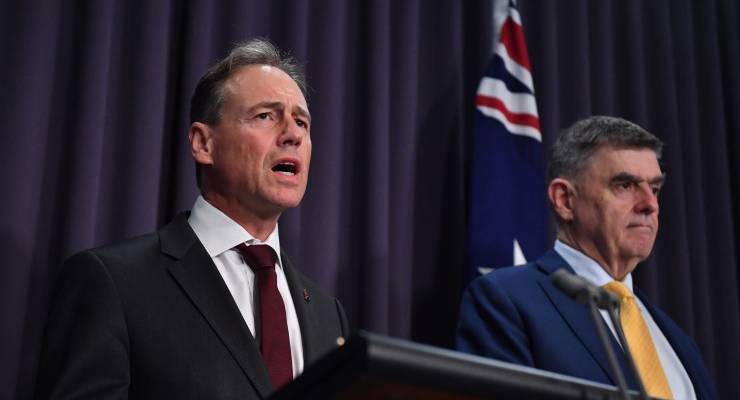
It’s never real until it affects you. First, there was a panicked stampede for toilet paper and I’m wondering whether my domestic stockpile will suffice.
Now I’ve had to do something really traumatic: I’ve read the Biosecurity Act.
The impending global pandemic of COVID-19 is likely to give us a taste of some absolutely dead serious police-state treatment. You think our security agencies and police forces have been given way too much discretionary power to infringe civil rights since 9/11? (That was a rhetorical question.)
Check out what the chief medical officer and health minister can do to you if you sneeze at the wrong time.
The key move came on January 21, when the decision was made (on the recommendation of peak governmental medical bodies the Australian Health Protection Principal Committee, and Communicable Disease Network Australia) to declare COVID-19 a Listed Human Disease under the act.
As an indication of the seriousness with which the authorities are viewing this, there are only seven other diseases on the list, including SARS, smallpox and plague.
If and when the World Health Organisation does declare a global pandemic that won’t change anything here; the trigger for the exercise of draconian powers has already been pulled.
The governing factors will now be a combination of political, economic and health considerations, particularly once the emphasis shifts from prevention (border closures) to mitigation (trying to restrict the spread and treat those infected).
The Biosecurity Act was given a complete overhaul in 2015 and is certainly now fit for the purpose of allowing the government to do all it practically can to contain an outbreak.
The powers it creates are, by design, largely immune to legal challenge. Essentially we are reliant on the individuals and agencies who exercise the powers to do so in a measured and responsible way.
Some of these powers are in the hands of Health Minister Greg Hunt, some the director of human biosecurity Dr Brendan Murphy (who is also the Commonwealth chief medical officer).
Then there are lesser but still quite invasive powers that can be exercised by other biosecurity officers down the bureaucratic chain.
Here are some of the things they can do:
- Impose compulsory screening for people entering the country, or just close the borders
- Require airlines and cruise lines to provide their passenger lists including contact details
- Prescribe “biosecurity measures” to be taken by specified classes of persons — for example making it illegal for Catholic priests to kiss a bishop’s ring (no, really)
- Impose a “biosecurity control order” on an individual who has been exposed to or shown symptoms of COVID-19, which can include mandatory decontamination, medical examination, vaccination, provision of body sample, restrictions on movement and behaviour, and physical isolation
- Declare “human health response zones” — like a shopping centre — and ban people from going there.
Attorney-General Christian Porter has come out on the front foot, saying explicitly that some or all of these things could happen, and acknowledging that “they will be in some instances strange and foreign to many Australians”.
If you ignore the politics of this situation (or at least give the Morrison government the benefit of the doubt which it absolutely does not deserve) and stand back from the nice ethical questions about the balance between personal human rights — including dignity — and the interests of the community as a whole, then an interesting paradox emerges.
We’re not talking here about crime, terrorism or espionage, the ordinary justifications for repressive executive powers being enforced on the populace.
It’s a disease, a natural phenomenon that does not discriminate between us and which, logically, we could defeat together by all just behaving with a bit of common sense.
But we don’t trust that we could or would do that. Instead, we believe that the presence of something existential, like a pandemic, will trigger the worst of human nature.
This is manifested by doomsday shopping, the epidemic spread of baseless rumours, the rise of xenophobia and racist othering, and other forms of outright anti-social selfishness. We’re not far from punch-ups in the aisles of Woolies, which is so ridiculous I’m a bit embarrassed to be a human right now.
Leadership — not the Morrison-style pretence of leadership but authentic leadership — would help a lot. However, it isn’t just the government that doesn’t trust us and is preparing for the worst accordingly.
Nor is it just the media, happily feeding our fears because COVID-19 is a gift from the heavens for their flagging business.
No, the Biosecurity Act — and the unbelievably extreme powers that it grants to do things to us that could never be done lawfully (and which we would not accept) in any other context — exists because we instinctively accept that it must.
Of course, it is that conviction that causes most of the anti-social behaviour. Why are people panic-buying tuna? Because other people are.
You’d think we might have evolved a bit more by now. Anyway, see you behind the wire.








Crikey is committed to hosting lively discussions. Help us keep the conversation useful, interesting and welcoming. We aim to publish comments quickly in the interest of promoting robust conversation, but we’re a small team and we deploy filters to protect against legal risk. Occasionally your comment may be held up while we review, but we’re working as fast as we can to keep the conversation rolling.
The Crikey comment section is members-only content. Please subscribe to leave a comment.
The Crikey comment section is members-only content. Please login to leave a comment.